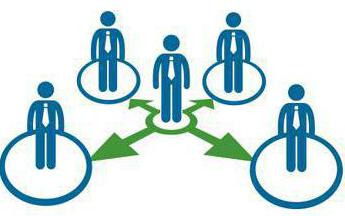A famous proverb says: "If you want to do something well, do it yourself." At the same time, working alone is far from as effective as sharing it among several employees. Delegation of authority in an organization is a stumbling block in the work of many companies. How to separate duty and responsibility, while not offending either themselves or employees? And is there a specific delegation procedure or is everything formalized by verbal agreements?
Why not?
Why are there problems of delegation of authority in the organization? Most often, the manager does not want to shift part of his duties to deputies or department heads because he fears their incompetence in some matters. The factor that some leaders tend to believe in their indispensability, that is, they believe that no one can do their work, plays a role here. As we know, there are no irreplaceable ones. At first, after the delegation, the chief in any case will have to carefully monitor the activities of the one who got his duties in order to make sure that he made the right choice. If an employee does not live up to expectations, he can safely be deprived of all additional powers and choose someone else in his place, or again take all the responsibilities onto his leadership shoulders. The delegation process is easily reversible. Shifting some of the affairs to other shoulders will help the head of the company unload and pay attention to some issues in the enterprise that he did not reach before or which he simply did not pay enough attention to. An employee who is honored to help, after such trust, is likely to become much more motivated, which will definitely have a positive effect on the quality of his work.
To whom to delegate?
Even realizing the benefits of the distribution and delegation of authority in the organization, some are in no hurry to use these management tools, not knowing who to choose as a replacement for themselves. There are several conditions under which a delegation will be truly successful:
- Despite the fact that at this moment attention to any issue is simply vital, it can be given to him not only directly by the leader. That is, questions, say, deliveries can be shifted to the head of the corresponding department, which, due to fewer responsibilities, will be able to tackle this or that problem more closely.
- Naturally, the employee to whom the duties are transferred must have certain experience in a particular field and, needless to say, relevant knowledge. It would not be entirely logical to entrust the marketing staff with hiring staff, and make the logistician responsible for outdoor advertising. This condition is one of the main advantages of delegation: the manager is unlikely to have equally good knowledge in all areas that are somehow related to his business, so delegating part of his authority to a specialist will help to look at many issues in a completely different way.

- We can’t say that it is possible to delegate authority in managing an organization or some other area of its life, if the head of the company does not trust the person to whom he is going to give his duties. Transferring the reins of power into other hands is far from easy, and transferring them to a completely stranger who can not only improve the situation in the company, but worsen it, is completely scary.Therefore, only one who enjoys the confidence of a leader can become a delegate;
- It is not enough to transfer responsibilities to one person, it is also necessary to transfer also the means by which to fulfill them. Even an expert accountant will not be able to analyze the financial activities of the company if he does not receive relevant reports for a certain period of time. Therefore, not only functions are delegated, but also resources without which there are functions that cannot be implemented.
Only of good will!
Naturally, delegation, like any other form of cooperation, should be voluntary. It is unlikely that anyone who, under pain of dismissal, was forced to take on the lion's share of the duties of the chief, will be able to work really productively. Moreover, before transferring directly, the parties must fully understand which powers and responsibilities are transferred. The delegate must have an idea of the methods used by the head to solve certain problems in order to build their own work on their basis. So the most important thing in the transfer of authority is to clearly explain what is required of someone who will be honored to help the head of the company.
What to delegate?
Although the delegation of authority is perceived by many as an important part of the organization’s function, even if the significance of this procedure is recognized, not everyone always understands what can be passed on to a subordinate. Is it really about the right to make a decision? No, it's not so serious right away.
You can start with the transfer of specific responsible tasks. For example, the head instructs an employee to prepare an important report on the activities of the company for a certain period of time, instead of doing it yourself. Even such seemingly small assignments are already part of the delegation process.
The transfer of entire projects is the next level that has the delegation of authority in an organization. Example: a firm needs to design a new product packaging. Instead of becoming the head of this, the chapter instructs the responsible employee to take on the duties of a manager: to select the people most suitable for this task, organize work, and monitor its quality. The head with such a transfer of duties will receive only a report on what has been done and, if something does not suit him, he will make certain recommendations that the delegate manager will have to take into account when further working on the project. Despite the fact that managing a specific project is more or less close to what the head of the company does every day, the delegation of such responsibilities will allow him to focus on issues that require his immediate attention.

The highest level of trust is the delegation of entire areas of activity. In large companies, examples of such a transfer of authority are department heads. They deal exclusively with supply, communications, marketing, and so on, providing only reports on their activities. The function of the leader with such delegation is minimal: he only indicates the goals and objectives, and achieving them is already a problem for delegates. This method is most convenient for large organizations that can afford to offload the leader in this way.
How to delegate?
So, the leader found the one to whom the delegation of authority in the organization will be carried out. Are the types of powers that can be transferred also worthy of a separate mention?
It should start with the fact that, as in any issue, there are many options for classifying species. For some, there are dozens of categories into which the transferred responsibilities can be divided; for some, fewer. The most common classification has become, where all powers are divided into only two groups: linear and staff.
Linear authority is the foundation of any company’s hierarchy.There are some responsibilities of the head, which he transfers to the head of the department. The head of the department, in turn, transfers part of these functions to a downstream employee. That is, the task goes from the very top of the service hierarchy to its bottom.

In the case of staff powers, the employee is given the right to help someone who performs linear powers. That is, the second employee can select the necessary information for the one who was instructed to draw up a sales report for a particular product for a specific period of time.
What about legal registration?
The head already knows the principles of delegation of authority in the organization, and on their basis he determined the candidacy to which he will transfer part of his concerns, he even chose what he would entrust to the new employee. But how does delegation itself happen? Is it carried out orally, simply by order, or is it formalized somehow legislatively?

To begin with, that any employee can refuse the functions delegated to him, this is prescribed in the Labor Code, which is the basis of the relationship between the employer and his subordinate. It is worth noting that further delegation (as in linear powers) is also possible only with the permission of the head: despite the fact that he transferred all his duties to another person, he is still responsible for them. That is, if the delegation goes to the lower levels of the hierarchy, the head of the company will be responsible for other employees who will be delegated his task.
Is it possible orally?
Organization of the delegation of authority is carried out, as already mentioned, on the basis of the Labor Code. According to him, in order for delegation to be formalized in accordance with all the rules, you will have to sign a power of attorney to transfer certain powers. Of course, the initial functions of the employee are prescribed in the employment contract, so the power of attorney will be necessary if the head decides to expand the field of his activity (even temporarily). But in most cases, everything can do without additional paperwork.
At the same time, some other employees should be notified of the transfer of new duties in order to assess the competence of the delegate and provide him with possible assistance in fulfilling the new duties, so that managers prefer to issue orders that all interested parties get acquainted with. On the other hand, all those affected by this appointment can simply be invited to a meeting at which everyone will learn about the delegate’s new credentials.
But if the delegation of tasks and powers in the organization is planned for a long period of time, and the totality of new responsibilities may well be perceived as another job, it is better to legally formalize the transfer of an employee to a new position, rather than constantly writing new powers of attorney.
What is the delegation process?
All the necessary formalities are settled, it remains only to find out what is the organization of the delegation of authority process. Naturally, no one will leave the newcomer with his duties one on one in the very first days of their implementation, so what principles should the leader follow in order for the delegation to succeed?
The very first days, the chapter shows the delegate absolutely everything, telling in detail about all aspects of the new powers. In short: "Watch how to do it." When the chief writes a report, the delegate observes his activities, remembering the order of actions, features of work programs and so on; when the head distributes responsibilities in a new project, the novice tries to analyze the choice of leader. It is at this stage that the delegate receives the most criticism, with a constructive one. In the future, all the advice that the head gave in these early days will be very useful.

The next step is the beginning of independent activity.All the same reports the delegate already writes himself under the vigilant control of the chief, who continues to criticize him and point out errors. The beginner himself tries to distribute the roles in the new project, without tips and advice from the main thing. This stage is much more difficult than the previous one, because it is far from easy to assume responsibility after you just watched how to properly perform your current duties. But after overcoming the initial difficulties, everything will go much easier.
The third stage, which has the delegation of authority in the organization, is relative independence. It is in many respects similar to the previous one, only there is much less control here. At this stage, the employee needs the support of the chief, who appreciates his efforts and even explains the problem much more softly than he did before if he did it. This time is given in order for the delegate to develop maximum autonomy in making his decisions, resorting to the advice of the head only in very crisis situations. After that, the easiest stage for the main person and the most pleasant stage for the delegate begins - complete freedom.
Did it work out?
How do I know if an organization successfully delegated? Responsibility, authority have been fully accepted by employees to whom the manager has trusted? Anyone who has already gone through the whole process of transferring powers should have absolute autonomy, within the framework of their duties, of course. Therefore, if a person prefers to be responsible only for some particular part of the work or still still needs the advice of higher-ranking persons, it can safely be said that the delegation was completely failed.

On the other hand, if the head instructs the person whom he chose as his delegate, the minimum amount of work, controls his activities much more carefully, constantly mentors his employee, then again we can talk about the failure of such a process as the distribution and delegation of authority in the organization. On the part of the principal, trust is needed, on the part of the subordinate, the readiness to justify this trust. This is the main principle of delegation.
Conclusion
Delegation of authority in an organization is an example of how a leader can make his own life easier by complicating it for others, and complicating it will be a joy to other employees. The advantages of the transfer of powers, as mentioned above, include the ability of the main to focus on more serious problems, turning over something that does not require his direct attention to others. Another advantage will be the identification of the most talented employees who in a new position will be able to demonstrate themselves in all its glory. The constant contact of the leader and the employee will teach them to better understand each other, which then will be useful in the future activities of both. The delegation of authority in the organization creates additional motivation: which employee does not want to be noticed and elevated? And given the constant expectation of this very increase, the employee will remain at his workplace much longer without changing it to a company where transfer of duties from a higher person is impossible.

Therefore, companies that go through far from simple steps for both the manager and employees to transfer powers will gain advantages over their competitors who do not want to share power within the company. So it’s clear: the delegation of authority in the organization is necessary for both its leaders and ordinary employees. This should always be remembered.